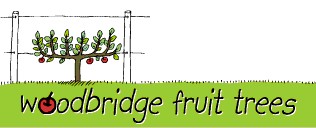No products
 View larger
View larger
Price Differential in Apples or How the Apple business works (or doesn’t)
by Bob Magnus | © 2006 Woodbridge Fruit Trees | www.woodbridgefruittrees.com.au
Humans have long ago worked out how to produce apples very efficiently. So much so that we can produce as many apples per hectare as potatoes – and we reached that curious point where you can buy apples even cheaper than potatoes.... Orchardists are leaving the industry in large numbers and the agricultural department keeps telling them to get bigger and even more efficient or to get out. I recently attended a field day at our local research station where a N.Z. expert was showing our local boys how to emulate New Zealand Hawk’s Bay growers and produce 50 tonnes of fruit per hectare. Here, at best, so our researchers say, they are only producing 35 -39 tonnes per hectare... a miserable effort!
Only 40 years ago a regular orchard of vase shaped trees was producing 25 tonnes per hectare and a family business was doing okay on 5 or 6 hectares. Who, how and what has put pressure on this valuable industry to change it so completely in such a short time?
In short: the demand of the market place. Agribusiness now determines the prices growers receive and the varieties to grow and growers have lost control of their own industry. No wonder they are getting out.
For most of their crop to be cost efficient today, an orchardist has to grow modern varieties – Royal Gala, Fuji and Pink Lady and the imperative is to grow 1st grade fruit, i.e. absolutely unblemished, evenly coloured and sized and for this he can expect around 80- 90 cents per kg. You can forget about the second grade stuff. To send it for juicing or processing you get less than $100 a tonne. China produces almost half the world’s apples and exports huge amounts of apple concentrate. When you read the label on a bottle of apple juice or cider it is usually written up in couched terms like 'made from local juice, when available', and apple concentrate. There are usually evocative brand names such as 'Mountain Valley Juices' or 'Nature’s Bounty 100% health juice'. You can bet it’s from China.
So the pressure is on growers to grow this immaculate fruit, and to pick them as soon as they are fit and get them into the cool store, also out of the way of all sorts of birds like parrots, rosellas and kurrawongs, and lots of bugs, before the starches in the fruit change to sugars and they really become tasty. If you leave them on the tree to mature it’s too late to coolstore them, a bit like all the bananas that are cut green and shipped South where they are artificially ripened as demand requires. You can’t send yellow bananas from Tully to Sydney nor tree ripened Cox’s Orange Pippins from Tasmania. Nature never intended matured fruit to be sent across oceans or continents.
A unique thing about apples is that the variety spectrum is constantly changing. In bananas we have Dwarf Cavendish and an occasional 'Lady’s Finger' year after year. In citrus 'Washington Navels' for half the year and Valencias the other half. Pears like Williams and Packhams appear with great regularity. In the apple business a variety has at present a commercial life of around 10 years. Remember all those varieties- some were really good- we’ve seen come and go: Jonagold, Mutsu, Bonza, Jonathon, Cox’s Orange, Macintosh, Worcester Permain, Granny Smith...
Somewhere, somehow new varieties appear on the scene and like new model cars they are zingier, shinier and faster and soon a premium is paid for them and the poor orchardist has to rip up his Fuji and plant Cameo or Jazz (just you wait!) so as to keep his return up. There are a whole number of new varieties waiting in the wings to be our no 1 variety: Honeycrisp, Orin, Florina, Delblush, Sonya, Sonata are just a few you may never even get to try, but next time you’re in the supermarket and see those perfect apples lying in their purple wraps under neon lights, ask yourself why you’re paying $4 or $4.50 a kg for apples that cost Coles or Woolies only 80c and why Chinese orchard workers get only $20 per week and what is the real price we pay in terms of our freedom of choice and being prisoners to the whole huge food production system we live with.
This product is no longer in stock
by Bob Magnus | © 2006 Woodbridge Fruit Trees | www.woodbridgefruittrees.com.au
Humans have long ago worked out how to produce apples very efficiently. So much so that we can produce as many apples per hectare as potatoes – and we reached that curious point where you can buy apples even cheaper than potatoes.... Orchardists are leaving the industry in large numbers and the agricultural department keeps telling them to get bigger and even more efficient or to get out. I recently attended a field day at our local research station where a N.Z. expert was showing our local boys how to emulate New Zealand Hawk’s Bay growers and produce 50 tonnes of fruit per hectare. Here, at best, so our researchers say, they are only producing 35 -39 tonnes per hectare... a miserable effort!
Only 40 years ago a regular orchard of vase shaped trees was producing 25 tonnes per hectare and a family business was doing okay on 5 or 6 hectares. Who, how and what has put pressure on this valuable industry to change it so completely in such a short time?
In short: the demand of the market place. Agribusiness now determines the prices growers receive and the varieties to grow and growers have lost control of their own industry. No wonder they are getting out.
For most of their crop to be cost efficient today, an orchardist has to grow modern varieties – Royal Gala, Fuji and Pink Lady and the imperative is to grow 1st grade fruit, i.e. absolutely unblemished, evenly coloured and sized and for this he can expect around 80- 90 cents per kg. You can forget about the second grade stuff. To send it for juicing or processing you get less than $100 a tonne. China produces almost half the world’s apples and exports huge amounts of apple concentrate. When you read the label on a bottle of apple juice or cider it is usually written up in couched terms like 'made from local juice, when available', and apple concentrate. There are usually evocative brand names such as 'Mountain Valley Juices' or 'Nature’s Bounty 100% health juice'. You can bet it’s from China.
So the pressure is on growers to grow this immaculate fruit, and to pick them as soon as they are fit and get them into the cool store, also out of the way of all sorts of birds like parrots, rosellas and kurrawongs, and lots of bugs, before the starches in the fruit change to sugars and they really become tasty. If you leave them on the tree to mature it’s too late to coolstore them, a bit like all the bananas that are cut green and shipped South where they are artificially ripened as demand requires. You can’t send yellow bananas from Tully to Sydney nor tree ripened Cox’s Orange Pippins from Tasmania. Nature never intended matured fruit to be sent across oceans or continents.
A unique thing about apples is that the variety spectrum is constantly changing. In bananas we have Dwarf Cavendish and an occasional 'Lady’s Finger' year after year. In citrus 'Washington Navels' for half the year and Valencias the other half. Pears like Williams and Packhams appear with great regularity. In the apple business a variety has at present a commercial life of around 10 years. Remember all those varieties- some were really good- we’ve seen come and go: Jonagold, Mutsu, Bonza, Jonathon, Cox’s Orange, Macintosh, Worcester Permain, Granny Smith...
Somewhere, somehow new varieties appear on the scene and like new model cars they are zingier, shinier and faster and soon a premium is paid for them and the poor orchardist has to rip up his Fuji and plant Cameo or Jazz (just you wait!) so as to keep his return up. There are a whole number of new varieties waiting in the wings to be our no 1 variety: Honeycrisp, Orin, Florina, Delblush, Sonya, Sonata are just a few you may never even get to try, but next time you’re in the supermarket and see those perfect apples lying in their purple wraps under neon lights, ask yourself why you’re paying $4 or $4.50 a kg for apples that cost Coles or Woolies only 80c and why Chinese orchard workers get only $20 per week and what is the real price we pay in terms of our freedom of choice and being prisoners to the whole huge food production system we live with.
Reviews
No customer reviews for the moment.

